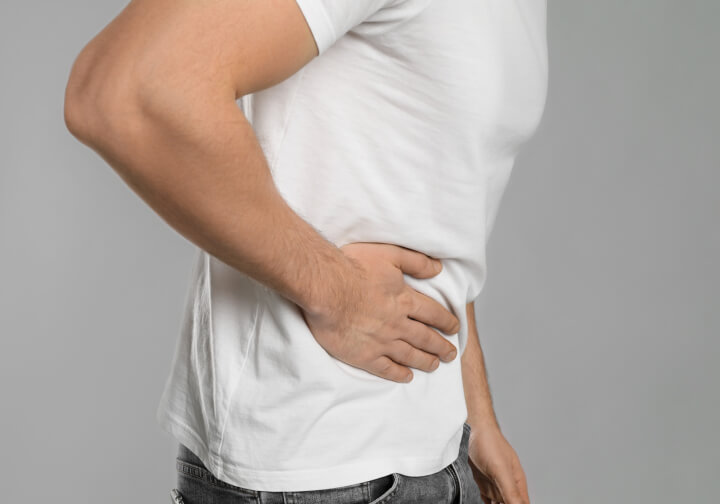
How to recognize appendicitis
Pain in the abdominal area can be harmless, but it can also signal a serious health problem. One of the most common acute conditions is appendicitis, which often requires urgent surgery. How can you tell that it is not just a "bloated stomach" or a dietary mistake, but something more serious? And how can you distinguish appendicitis from problems with the gallbladder, urinary tract, or liver?
We have prepared a practical overview to help you understand the symptoms and know when it is appropriate to see a doctor.
How to recognize appendicitis?
Typical symptoms of appendicitis include the following:
-
Intense abdominal pain, which usually starts around the navel and moves to the lower right abdomen within a few hours.
-
Worsening pain when walking, coughing, or tensing the abdominal muscles.
-
Loss of appetite, nausea, vomiting (usually after the onset of pain).
-
Mild to moderate fever (up to 38 °C).
-
Constipation or watery stools.
-
Feeling of bloating, sometimes with gas retention.
-
In some people (especially young children, the elderly, and pregnant women), the symptoms may not be entirely typical. The pain may be mild or localized elsewhere.
How can you "test" yourself for appendicitis?
Of course, no home test can replace a medical examination, but the following procedures can help you determine if you are indeed experiencing a health problem:
-
Jump test: try jumping lightly or coughing. If you immediately experience sharp pain in your right lower abdomen, it may be a sign of peritoneal irritation.
-
Press and release: gently press on your right lower abdomen and quickly release. If the pain intensifies after you remove your hand than when you pressed, it may be a symptom of appendicitis.
When to see a doctor?
If you are experiencing lower abdominal pain and notice the following symptoms, you should see a doctor. Specifically, you should be alert in the following situations:
-
The pain lasts more than 4 to 6 hours and intensifies.
-
The pain is localized in the lower right abdomen.
-
You have a fever, nausea, or vomiting.
-
You cannot straighten up or stand up straight.
-
You feel abdominal tension that is hard to the touch.
If appendicitis is suspected, it is necessary to seek medical attention immediately. Untreated inflammation can rupture and lead to a serious infection of the peritoneum (peritonitis).
How to recognize other possible causes of pain?
Of course, there can be a number of other causes of abdominal and lower abdominal pain. We have prepared an overview for you.
Gallbladder (e.g., gallbladder colic)
-
Pain in the right upper abdomen or under the breastbone, often radiating to the right shoulder blade.
-
Often after a fatty meal.
-
May be associated with nausea, bitterness in the mouth, belching.
-
The pain is cramp-like and comes in waves.
Liver
-
Dull pain in the right upper abdomen.
-
May be associated with jaundice (yellowing of the whites of the eyes, skin), fatigue, loss of appetite.
-
In diseases such as hepatitis, the pain is usually diffuse, not sharp.
Bladder or urinary tract
-
Burning sensation when urinating, frequent urge to urinate.
-
Pain in the lower abdomen, sometimes back pain.
-
Blood in the urine, foul-smelling urine.
-
In men, it can sometimes be related to the prostate.
Gynecological problems (in women)
-
The pain may be one-sided, e.g., in the case of an ovarian cyst.
-
Irregular bleeding, discharge, changes in the menstrual cycle.
-
In pregnant women, it is necessary to rule out an ectopic pregnancy.
Key differences in the location of pain in the abdominal area
|
Organ/cause |
Location of pain |
Other symptoms |
|
Appendicitis (appendix) |
Right lower abdomen |
Vomiting, fever, pain radiating from the navel |
|
Gallbladder |
Right upper abdomen, below the rib cage |
Pain after eating, nausea |
|
Liver |
Right upper abdomen |
Jaundice, fatigue |
|
Urinary tract |
Lower abdomen, painful urination |
Burning sensation, frequent urination |
|
Ovaries/uterus |
Lower abdomen (one side) |
Discharge, irregular periods |
If you still have doubts after reading this article, the golden rule applies: it is better to contact your doctor immediately and not wait for your condition to worsen. In the case of appendicitis, every hour counts. You can also make an appointment at our gastroenterology department for routine preventive examinations and non-urgent cases.
Sources:
https://www.nzip.cz/clanek/628-akutni-zanet-slepeho-streva-u-deti
https://euc.cz/clanky-a-novinky/clanky/zanet-slepeho-streva-jake-jsou-priciny-priznaky-a-lecba/
https://www.benu.cz/jak-poznat-zanet-slepeho-streva
https://www.pilulka.cz/zanet-slepeho-streva-priznaky-a-lecba
